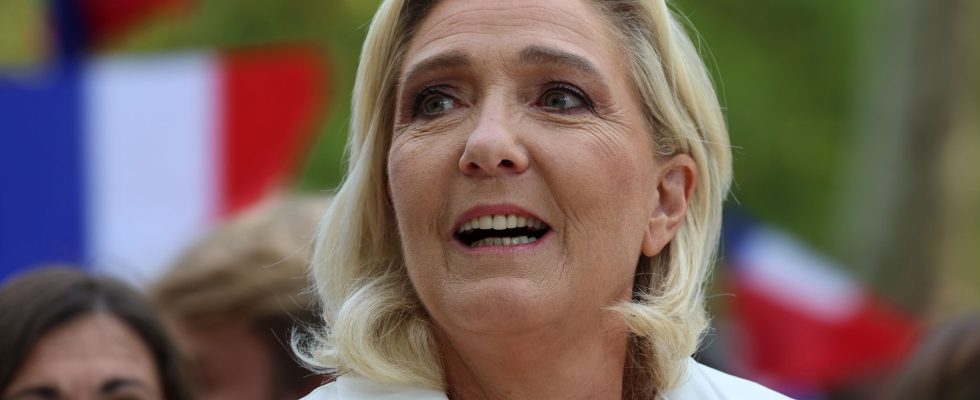Marine Le Pen has just proposed a “Declaration of the Rights of Nations and Peoples” which aims to protect peoples and nations from the undue intervention of supranational structures, such as the EU or Gafam. This Declaration sets out the rights of these nations and peoples to, among other things, sovereignty, the defense of their vital interests and even identity. Even if the chances of adoption of this text, which must be the subject of a constitutional bill and a resolution in the European Parliament, seem zero, and even if its operational nature is doubtful – even if signed by several nations , it could not surpass existing European or international law – it is sufficiently aberrant for us to stop at it. This Declaration, in fact, affirms national primacy not only over international law but, implicitly, over individual rights.
>> Subscribe to Expression, the newsletter of ideas from L’Express by clicking here.
We find a first clue in its grotesque title, “Declaration of the Rights of Nations and Peoples proposed by Marine Le Pen”. This formulation in fact exposes the contradiction, inherent in populism, between the respect displayed for the demos and the exorbitant role given to a leader with a firm hand. In contrast, the rights of our Declaration of the Rights of Man and of the Citizen of 1789 are presented by “the representatives of the French people, constituted in the National Assembly”. This is a first obvious sign, known but needing to be remembered, of populist deception.
Populism claims to have the defense of the people at heart but has nothing but contempt for them. Because the people are made up of individuals, and the first target of populists is often individual rights. Let us read, to convince ourselves, the beginning of article 2 of Marine Le Pen’s Declaration: “the goal of any political association, national or international, is the conservation natural and inalienable rights of peoples and Nations” (emphasis added). This will perhaps remind you of article 2 of our Declaration of the Rights of Man and of the Citizen of 1789: “the aim of all political association is the conservation natural and inalienable human rights” (emphasis added). Quickly read, the two statements seem close; in reality, a gap separates them.
“Society exists only for the individual”
We must take the full measure of the meaning of article 2, Le Pen style. The characteristic of a liberal democracy like ours is to consider that the collective exists for the individual, not the opposite. To use a phrase from Paul Claudel, “the individual alone is a poor being, a being easily defeated, and he needs a favorable environment to develop his possibilities. But society only exists for the individual and not the other way around. However, the formulation of the Lepenist Declaration implies that the individual, quite the contrary, only exists for the collective. Here we find a simply reactionary position, one that the counter-revolutionary right has defended for more than a century. This is how the politician and writer Louis de Bonald could write that “man only exists through society and society only forms him for it” (Theory of political and religious power, 1796). As a result, he castigated the Revolution which, through its promotion of individual rights, had destroyed the community for the benefit of atomized individuals. However, to defend such a position, today as yesterday, is to expose the individual to the arbitrariness of power in the name of the interests of the nation.
The voters of the National Rally, like those of Eric Zemmour, are no less individualistic than the rest of the French. They are even the first to rebel when their rights are contested. But we do not defend the individual rights that suit us and when they suit us, we support them as a whole, because they come as a whole, and no one is safe from becoming the unfortunate target, one day. or the other, arbitrary.
Of course, sometimes individual rights collide with the national interest. It is for this reason that a democracy may be led to take exceptional measures, by definition temporary, as the response to the Covid-19 epidemic has shown. If we can discuss the extent and modalities of this response, we must recognize that certain phenomena, which are truly collective, require a reaction which is just as collective. When a risk threatens a community to the point where it can cause excessive harm to the individuals who make it up, the limitation or temporary suspension of certain rights is not aberrant.
More broadly, the individual is indebted, to a certain extent, to the political group to which he belongs and without which his rights would be non-existent. The Western individual, moreover, owes a lot to his ancestors who knew how to bring about political liberalism from a Christianity already open to the idea of secularization. In other words, we have a duty of gratitude towards our history, our customs and our morals, or at the very least that of not harming them, otherwise we would find ourselves deprived of the soil which makes our life together possible. . However, this charge does not relate to the legal sphere but quite simply to politics.
